- Home
- Jack Kerouac
The Subterraneans
The Subterraneans Read online
The Subterraneans
WORKS BY JACK KEROUAC
Published by Grove Press
Dr. Sax
Lonesome Traveler
Mexico City Blues
Satori in Paris and Pic
The Subterraneans
The Subterraneans
JACK KEROUAC
Copyright © 1958 by Jack Kerouac
All rights reserved. No part of this book may be reproduced in any form or by any electronic or mechanical means, or the facilitation thereof, including information storage and retrieval systems, without permission in writing from the publisher, except by a reviewer, who may quote brief passages in a review. Any members of educational institutions wishing to photocopy part or all of the work for classroom use, or publishers who would like to obtain permission to include the work in an anthology, should send their inquiries to Grove/Atlantic, Inc., 841 Broadway, New York, NY 10003.
Published simultaneously in Canada
Printed in the United States of America
Library of Congress Catalog Card Number 58-6703
eBook ISBN-13: 978-0-8021-9571-5
Grove Press
an imprint of Grove/Atlantic, Inc.
841 Broadway
New York, NY 10003
Distributed by Publishers Group West
www.groveatlantic.com
The Subterraneans
ONCE I WAS YOUNG and had so much more orientation and could talk with nervous intelligence about everything and with clarity and without as much literary preambling as this; in other words this is the story of an unself-confident man, at the same time of an egomaniac, naturally, facetious won’t do—just to start at the beginning and let the truth seep out, that’s what I’ll do—. It began on a warm summernight—ah, she was sitting on a fender with Julien Alexander who is … let me begin with the history of the subterraneans of San Francisco …
Julien Alexander is the angel of the subterraneans, the subterraneans is a name invented by Adam Moorad who is a poet and friend of mine who said “They are hip without being slick, they are intelligent without being corny, they are intellectual as hell and know all about Pound without being pretentious or talking too much about it, they are very quiet, they are very Christlike.” Julien certainly is Christlike. I was coming down the street with Larry O’Hara old drinking buddy of mine from all the times in San Francisco in my long and nervous and mad careers I’ve gotten drunk and in fact cadged drinks off friends with such “genial” regularity nobody really cared to notice or announce that I am developing or was developing, in my youth, such bad freeloading habits though of course they did notice but liked me and as Sam said “Everybody comes to you for your gasoline boy, that’s some filling station you got there” or say words to that effect—old Larry O’Hara always nice to me, a crazy Irish young businessman of San Francisco with Balzacian backroom in his bookstore where they’d smoke tea and talk of the old days of the great Basie band or the days of the great Chu Berry—of whom more anon since she got involved with him too as she had to get involved with everyone because of knowing me who am nervous and many leveled and not in the least one-souled—not a piece of my pain has showed yet—or suffering—Angels, bear with me—I’m not even looking at the page but straight ahead into the sadglint of my wallroom and at a Sarah Vaughan Gerry Mulligan Radio KROW show on the desk in the form of a radio, in other words, they were sitting on the fender of a car in front of the Black Mask bar on Montgomery Street, Julien Alexander the Christlike unshaved thin youthful quiet strange almost as you or as Adam might say apocalyptic angel or saint of the subterraneans, certainly star (now), and she, Mardou Fox, whose face when first I saw it in Dante’s bar around the corner made me think, “By God, I’ve got to get involved with that little woman” and maybe too because she was Negro. Also she had the same face that Rita Savage a girlhood girlfriend of my sister’s had, and of whom among other things I used to have daydreams of her between my legs while kneeling on the floor of the toilet, I on the seat, with her special cool lips and Indian-like hard high soft cheekbones—same face, but dark, sweet, with little eyes honest glittering and intense she Mardou was leaning saying something extremely earnestly to Ross Wallenstein (Julien’s friend) leaning over the table, deep—“I got to get involved with her” —I tried to shoot her the glad eye the sex eye she never had a notion of looking up or seeing—I must explain, I’d just come off a ship in New York, paid off before the trip to Kobe Japan because of trouble with the steward and my inability to be gracious and in fact human and like an ordinary guy while performing my chores as saloon messman (and you must admit now I’m sticking to the facts), a thing typical of me, I would treat the first engineer and the other officers with backwards-falling politeness, it finally drove them angry, they wanted me to say something, maybe gruff, in the morning, while setting their coffee down and instead of which silently on crepefeet I rushed to do their bidding and never cracked a smile or if so a sick one, a superior one, all having to do with that loneliness angel riding on my shoulder as I came down warm Montgomery Street that night and saw Mardou on the fender with Julien, remembering, “O there’s the girl I gotta get involved with, I wonder if she’s going with any of these boys”—dark, you could barely see her in the dim street—her feet in thongs of sandals of such sexuality-looking greatness I wanted to kiss her, them—having no notion of anything though.
The subterraneans were hanging outside the Mask in the warm night, Julien on the fender, Ross Wallenstein standing up, Roger Beloit the great bop tenorman, Walt Fitzpatrick who was the son of a famous director and had grown up in Hollywood in an atmosphere of Greta Garbo parties at dawn and Chaplin falling in the door drunk, several other girls, Harriet the ex-wife of Ross Wallenstein a kind of blonde with soft expressionless features and wearing a simple almost housewife-in-the-kitchen cotton dress but softly bellysweet to look at—as another confession must be made, as many I must make ere time’s sup—I am crudely malely sexual and cannot help myself and have lecherous and so on propensities as almost all my male readers no doubt are the same—confession after confession, I am a Canuck, I could not speak English till I was 5 or 6, at 16 I spoke with a halting accent and was a big blue baby in school though varsity basketball later and if not for that no one would have noticed I could cope in any way with the world (underself-confidence) and would have been put in the madhouse for some kind of inadequacy—
But now let me tell Mardou herself (difficult to make a real confession and show what happened when you’re such an egomaniac all you can do is take off on big paragraphs about minor details about yourself and the big soul details about others go sitting and waiting around)—in any case, therefore, also there was Fritz Nicholas the titular leader of the subterraneans, to whom I said (having met him New Year’s Eve in a Nob Hill swank apartment sitting crosslegged like a peote Indian on a thick rug wearing a kind of clean white Russian shirt and a crazy Isadora Duncan girl with long blue hair on his shoulder smoking pot and talking about Pound and peote) (thin also Christlike with a faun’s look and young and serious and like the father of the group, as say, suddenly you’d see him in the Black Mask sitting there with head thrown back thin dark eyes watching everybody as if in sudden slow astonishment and “Here we are little ones and now what my dears,” but also a great dope man, anything in the form of kicks he would want at any time and very intense) I said to him, “Do you know this girl, the dark one?”—“Mardou?”— “That her name? Who she go with?”—“No one in particular just now, this has been an incestuous group in its time,” a very strange thing he said to me there, as we walked to his old beat 36 Chevvy with no backseat parked across from the bar for the purpose of picking up some tea for the group to get all together, as, I told Larry, “Man, let
’s get some tea.”—“And what for you want all those people?”— “I want to dig them as a group,” saying this, too, in front of Nicholas so perhaps he might appreciate my sensitivity being a stranger to the group and yet immediately, etc., perceiving their value—facts, facts, sweet philosophy long deserted me with the juices of other years fled—incestuous—there was another final great figure in the group who was however now this summer not here but in Paris, Jack Steen, very interesting Leslie-Howard-like little guy who walked (as Mardou later imitated for me) like a Viennese philosopher with soft arms swinging slight side flow and long slow flowing strides, coming to a stop on corner with imperious soft pose—he too had had to do with Mardou and as I learned later most weirdly—but now my first crumb of information concerning this girl I was SEEKING to get involved with as if not enough trouble already or other old romances hadn’t taught me that message of pain, keep asking for it, for life—
Out of the bar were pouring interesting people, the night making a great impression on me, some kind of Truman-Capote-haired dark Marlon Brando with a beautiful thin birl or girl in boy slacks with stars in her eyes and hips that seemed so soft when she put her hands in her slacks I could see the change—and dark thin slackpant legs dropping down to little feet, and that face, and with them a guy with another beautiful doll, the guy’s name Rob and he’s some kind of adventurous Israeli soldier with a British accent whom I suppose you might find in some Riviera bar at 5 A.M. drinking everything in sight alphabetically with a bunch of interesting crazy international-set friends on a spree—Larry O’Hara introducing me to Roger Beloit (I did not believe that this young man with ordinary face in front of me was that great poet I’d revered in my youth, my youth, my youth, that is, 1948, I keep saying my youth)— “This is Roger Beloit?—I’m Bennett Fitzpatrick” (Walt’s father) which brought a smile to Roger Beloit’s face—Adam Moorad by now having emerged from the night was also there and the night would open—
So we all did go to Larry’s and Julien sat on the floor in front of an open newspaper in which was the tea (poor quality L.A. but good enough) and rolled, or “twisted,” as Jack Steen, the absent one, had said to me the previous New Year’s and that having been my first contact with the subterraneans, he’d asked to roll a stick for me and I’d said really coldly “What for? I roll my own” and immediately the cloud crossed his sensitive little face, etc., and he hated me—and so cut me all the night when he had a chance—but now Julien was on the floor, crosslegged, and himself now twisting for the group and every body droned the conversations which I certainly won’t repeat, except, it was, like, “I’m looking at this book by Percepied—who’s Percepied, has he been busted yet?” and such small talk, or, while listening to Stan Kenton talking about the music of tomorrow and we hear a new young tenorman come on, Ricci Comucca, Roger Beloit says, moving back expressive thin purple lips, “This is the music of tomorrow?” and Larry O’Hara telling his usual stock repertoire anecdotes. In the 36 Chewy on the way, Julien, sitting beside me on the floor, had stuck out his hand and said, “My name’s Julien Alexander, I have something, I conquered Egypt,” and then Mardou stuck her hand out to Adam Moorad and introduced herself, saying, “Mardou Fox,” but didn’t think of doing it to me which should have been my first inkling of the prophecy of what was to come, so I had to stick my hand at her and say, “Leo Percepied my name” and shake—ah, you always go for the ones who don’t really want you—she really wanted Adam Moorad, she had just been rejected coldly and subterraneanly by Julien—she was interested in thin ascetic strange intellectuals of San Francisco and Berkeley and not in big paranoiac bums of ships and railroads and novels and all that hatefulness which in myself is to myself so evident and so to others too—though and because ten years younger than I seeing none of my virtues which anyway had long been drowned under years of drugtaking and desiring to die, to give up, to give it all up and forget it all, to die in the dark star—it was I stuck out my hand, not she—ah time.
But in eying her little charms I only had the foremost one idea that I had to immerse my lonely being (“A big sad lonely man,” is what she said to me one night later, seeing me suddenly in the chair) in the warm bath and salvation of her thighs—the intimacies of younglovers in a bed, high, facing eye to eye, breast to breast naked, organ to organ, knee to shivering goose-pimpled knee, exchanging existential and loveracts for a crack at making it— “making it” the big expression with her, I can see the little out-pushing teeth through the little redlips seeing “making it”—the key to pain—she sat in the corner, by the window, she was being “separated” or “aloof” or “prepared to cut out from this group” for her own reasons.—In the corner I went, not leaning my head on her but on the wall and tried silent communication, then quiet words (as befit party) and North Beach words, “What are you reading?” and for the first time she opened her mouth and spoke to me communicating a full thought and my heart didn’t exactly sink but wondered when I heard the cultured funny tones of part Beach, part I. Magnin model, part Berkeley, part Negro highclass, something, a mixture of langue and style of talking and use of words I’d never heard before except in certain rare girls of course white and so strange even Adam at once noticed and commented with me that night—but definitely the new bop generation way of speaking, you don’t say I, you say “ahy” or “Oy” and long ways, like oft or erstwhile “effeminate” way of speaking so when you hear it in men at first it has a disagreeable sound and when you hear it in women it’s charming but much too strange, and a sound I had already definitely and wonderingly heard in the voice of new bop singers like Jerry Winters especially with Kenton band on the record Yes Daddy Yes and maybe in Jeri Southern too—but my heart sank for the Beach has always hated me, cast me out, overlooked me, shat on me, from the beginning in 1943 on in—for look, coming down the street I am some kind of hoodlum and then when they learn I’m not a hoodlum but some kind of crazy saint they don’t like it and moreover they’re afraid I’ll suddenly become a hoodlum anyway and slug them and break things and this I have almost done anyway and in my adolescence did so, as one time I roamed through North Beach with the Stanford basketball team, specifically with Red Kelly whose wife (rightly?) died in Redwood City in 1946, the whole team behind us, the Garetta brothers besides, he pushed a violinist a queer into a doorway and I pushed another one in, he slugged his, I glared at mine, I was 18, I was a nannybeater and fresh as a daisy too—now, seeing this past in the scowl and glare and horror and the beat of my brow-pride they wanted nothing to do with me, and so I of course also knew that Mardou had real genuine distrust and dislike of me as I sat there “trying to (not make IT) but make her”—unhiplike, brash, smiling, the false hysterical “compulsive” smiling they call it—me hot—them cool—and also I had on a very noxious unbeachlike shirt, bought on Broadway in New York when I thought I’d be cutting down the gangplanks in Kobe, a foolish Crosby Hawaiian shirt with designs, which malelike and vain after the original honest humilities of my regular self (really) with the smoking of two drags of tea I felt constrained to open an extra button down and so show my tanned, hairy chest—which must have disgusted her—in any case she didn’t look, and spoke little and low—and was intent on Julien who was squatting with his back to her—and she listened and murmured the laughter in the general talk—most of the talk being conducted by O’Hara and loudspeaking Roger Beloit and that intelligent adventurous Rob and I, too silent, listening, digging, but in the tea vanity occasionally throwing in “perfect” (I thought) remarks which were “too perfect” but to Adam Moorad who’d known me all the time clear indication of my awe and listening and respect of the group in fact, and to them this new person throwing in remarks intended to sow his hipness—all horrible, and unredeemable.—Although at first, before the puffs, which were passed around Indian style, I had the definite sensation of being able to come close with Mardou and involved and making her that very first night, that is taking off with her alone if only for coffee but with the puffs w
hich made me pray reverently and in serious secrecy for the return of my pre-puff “sanity” I became extremely unself-confident, overtrying, positive she didn’t like me, hating the facts—remembering now the first night I met my Nicki Peters love in 1948 in Adam Moorad’s pad in (then) the Fillmore, I was standing unconcerned and beerdrinking in the kitchen as ever (and at home working furiously on a huge novel, mad, cracked, confident, young, talented as never since) when she pointed to my profile shadow on the pale green wall and said, “How beautiful your profile is,” which so nonplussed me and (like the tea) made me unself-confident, attentive, attempting to “begin to make her,” to act in that way which by her almost hypnotic suggestion now led to the first preliminary probings into pride vs. pride and beauty or beatitude or sensitivity versus the stupid neurotic nervousness of the phallic type, forever conscious of his phallus, his tower, of women as wells—the truth of the matter being there, but the man unhinged, unrelaxed, and now it is no longer 1948 but 1953 with cool generations and I five years older, or younger, having to make it (or make the women) with a new style and stow the nervousness—in any case, I gave up consciously trying to make Mardou and settled down to a night of digging the great new perplexing group of subterraneans Adam had discovered and named on the Beach.
But from the first Mardou was indeed self-dependent and independent announcing she wanted no one, nothing to do with anyone, ending (after me) with same—which now in the cold unblessing night I feel in the air, this announcement of hers, and that her little teeth are no longer mine but probably my enemy’s lapping at them and giving her the sadistic treatment she probably loves as I had given her none—murders in the air—and that bleak corner where a lamp shines, and winds swirl, a paper, fog, I see the great discouraged face of myself and my so-called love drooping in the lane, no good—as before it had been melancholy droopings in hot chairs, downcast by moons (though tonight’s the great night of the harvest moon)—as where then, before, it was the recognition of the need for my return to worldwide love as a great writer should do, like a Luther, a Wagner, now this warm thought of greatness is a big chill in the wind—for greatness dies too—ah and who said I was great—and supposing one were a great writer, a secret Shakespeare of the pillow night? or really so—a Baudelaire’s poem is not worth his grief—his grief—(It was Mardou finally said to me, “I would have preferred the happy man to the unhappy poems he’s left us,” which I agree with and I am Baudelaire, and love my brown mistress and I too leaned to her belly and listened to the rumbling underground)—but I should have known from her original announcement of independence to believe in the sincerity of her distaste for involvement, instead hurling on at her as if and because in fact I wanted to be hurt and “lacerate” myself—one more laceration yet and they’ll pull the blue sod on, and make my box plop boy—for now death bends big wings over my window, I see it, I hear it, I smell it, I see it in the limp hang of my shirts destined to be not worn, new-old, stylish-out-of-date, neckties snakelike behung I don’t even use any more, new blankets for autumn peace beds now writhing rushing cots on the sea of self-murder—loss—hate—paranoia—it was her little face I wanted to enter, and did—

 Tristessa
Tristessa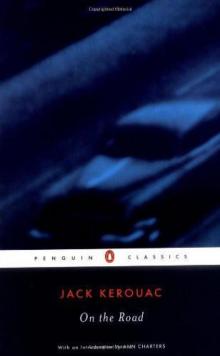 On the Road
On the Road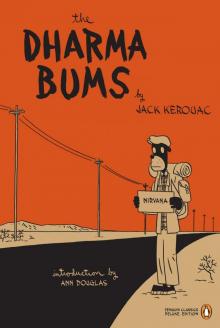 The Dharma Bums
The Dharma Bums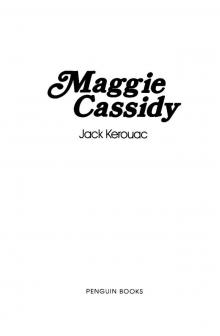 Maggie Cassidy
Maggie Cassidy Big Sur
Big Sur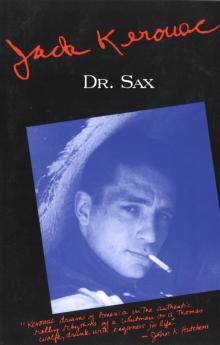 Dr. Sax
Dr. Sax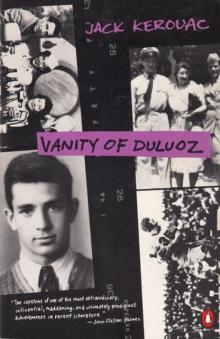 Vanity of Duluoz: An Adventurous Education, 1935-46
Vanity of Duluoz: An Adventurous Education, 1935-46 The Sea Is My Brother
The Sea Is My Brother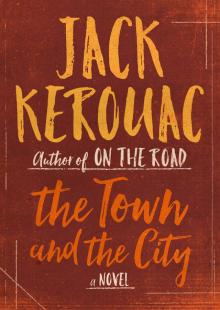 The Town and the City: A Novel
The Town and the City: A Novel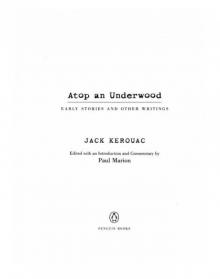 Atop an Underwood: Early Stories and Other Writings
Atop an Underwood: Early Stories and Other Writings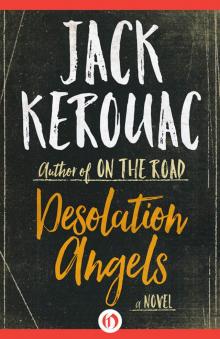 Desolation Angels: A Novel
Desolation Angels: A Novel Book of Sketches
Book of Sketches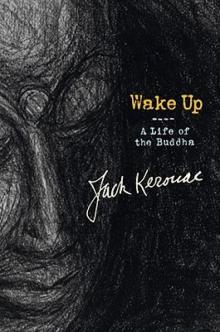 Wake Up: A Life of the Buddha
Wake Up: A Life of the Buddha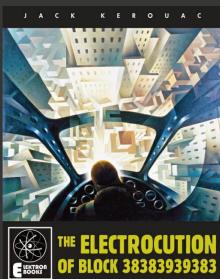 The Electrocution of Block 38383939383
The Electrocution of Block 38383939383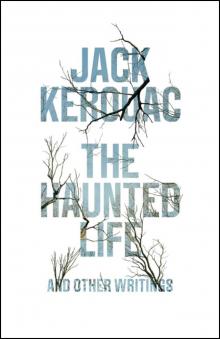 Haunted Life
Haunted Life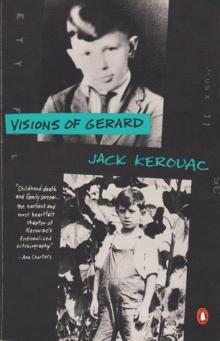 Visions of Gerard
Visions of Gerard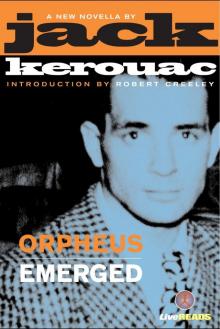 Orpheus Emerged
Orpheus Emerged Book of Blues
Book of Blues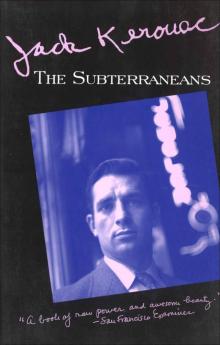 The Subterraneans
The Subterraneans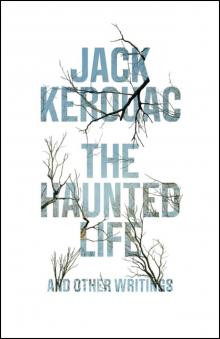 The Haunted Life
The Haunted Life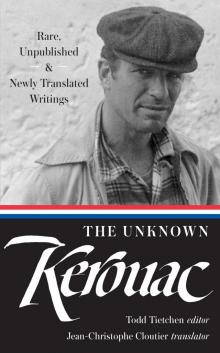 The Unknown Kerouac
The Unknown Kerouac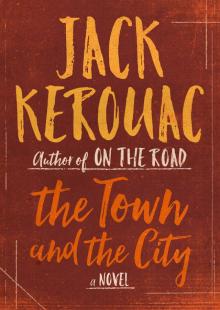 The Town and the City
The Town and the City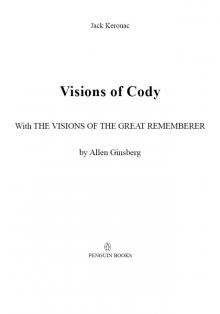 Visions of Cody
Visions of Cody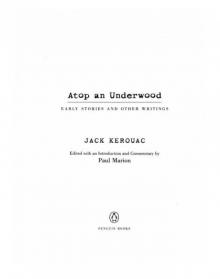 Atop an Underwood
Atop an Underwood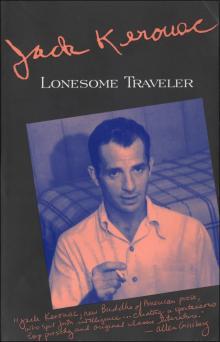 Lonesome Traveler
Lonesome Traveler Jack Kerouac and Allen Ginsberg
Jack Kerouac and Allen Ginsberg Vanity of Duluoz
Vanity of Duluoz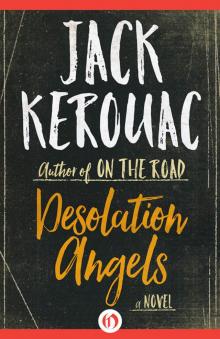 Desolation Angels
Desolation Angels On the Road: The Original Scroll: (Penguin Classics Deluxe Edition)
On the Road: The Original Scroll: (Penguin Classics Deluxe Edition) The Sea Is My Brother: The Lost Novel
The Sea Is My Brother: The Lost Novel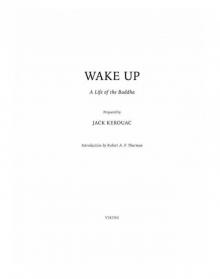 Wake Up
Wake Up The Poetry of Jack Kerouac
The Poetry of Jack Kerouac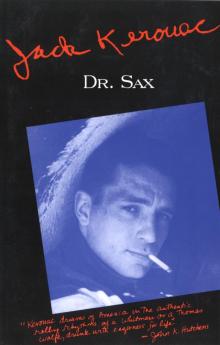 Doctor Sax
Doctor Sax